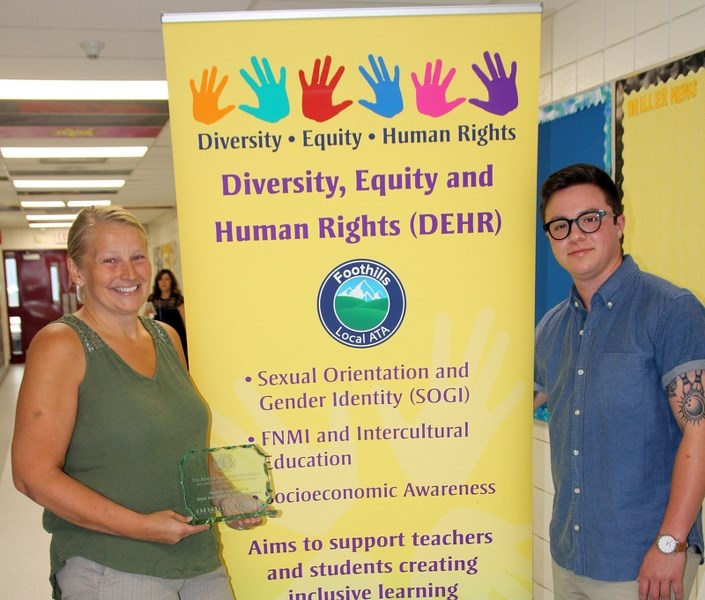A pair of teachers in the Foothills area have been honoured for celebrating diversity in the community.
Guidance counsellor Paulette Morck and Westmount School teacher Jamie Anderson of Foothills Local 16 of the Alberta Teachers Association received the province-wide ATA’s Diversity Equity Human Rights Award in mid August in recognition of the their work with Gay Straight Alliances (GSA).
“We received the award in recognition for our Rural Gay Straight Alliance Network,” said Morck, a former guidance counsellor at Oilfields High School, who has transferred to High River’s Highwood High this year.
“This brings together Gay Straight Alliance groups from as far south as Nanton and includes the Strathcona-Tweedsmuir School.”
Although the Foothills School Division has GSAs at all of its high schools and some of its junior high schools (there are also GSAs at J.T. Foster in Nanton, and Okotoks-area STS), the rural network is not a division initiative but came from the teachers in Local 16.
Reaching out to students from small towns is key to the network.
“The rural community is pretty isolated, and to be recognized at the provincial level for what we do for rural kids is important,” Morck said. “We have these kids from small schools who are really isolated and are needing to connect with other kids, just get together and have fun, that’s really important.”
Morck and Anderson, a teacher who is transgender, started the network approximately two years ago.
“The peer-to-peer support was a goal, we know there are LGBTQ kids in those communities, but they don’t have safe spaces where they can connect with peers to share experiences — experiences of living in a rural community, experiences of not being out, experiences of not having a lot of supportive adults,” Morck said.
That support comes from all peers, it’s not restricted to LGBTQ students.
The “S” in GSA stands for straight.
“For the students that are straight, it’s important that they know they have a voice to change the world and they can be a strong ally for their peers,” Morck said “For the LGBTQ kids, it’s knowing they have people in the community who have their backs.”
Anderson agreed.
“It is really important for LGBTQ students to have students there to support them and are ready to speak up,” Anderson said.
“When you are already experiencing trauma, to stand up for yourself is difficult.”
Anderson knows of what he speaks. He attended a Catholic high school in Brooks, which did not have a GSA.
“I wasn’t able to find institutional (school) support or peer support until university,” Anderson said. “I had a lot of supportive friends who didn’t necessarily know I was LGBTQ, but I also got teased because I was different…
“Like a lot of students in the rural community, you play a role you are not — you try to be something you are not.”
Fortunately, he had strong support from his family. He said for an LGBTQ student a strong adult role model is an important factor in the student’s life.
Morgan Burton, a graduate of Oilfields High School who is bisexual, was a member of the school’s first GSA when it was established five years ago.
“It was a safe place where all sorts of different kids could come together, that’s why it was so important,” Burton said. “A place to make friends, tell your story about being judged — we need these kind of places.”
She said prior to the GSAs, Oilfields was accepting, but students were not as educated as they could be concerning LGBTQ issues.
She said that changed in the years following the GSA.
Morck said the change can be heard. She said last year, a new teacher from Ontario was amazed that words like “that’s so gay” or “homo” had been all but eliminated from the students’ vernacular.
Robert Mazzotta, co-ordinator of members services with ATA, sat on the panel that selected Local 16 the award recipients for the Rural Gay Straight Alliance Network.
“It was a larger project that involved many different schools and many different age groups as opposed to just one isolated school with one activity,” Mazzotta said. “It was a series of events that involved many schools and students.”
The network is open to all students regardless whether their school has a GSA.
For more information about the network email [email protected]




